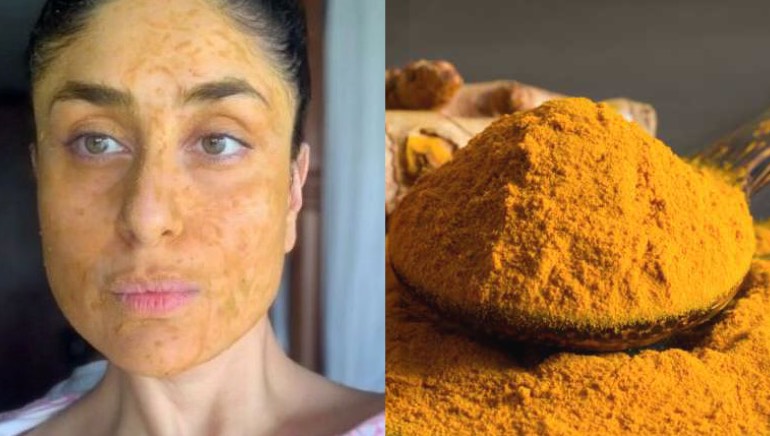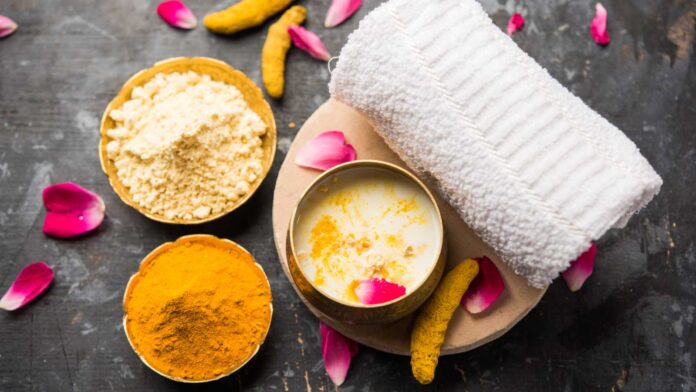Skincare benefits of turmeric: How this powerful spice can brighten your skin, combat inflammation, and elevate your beauty routine.
As the search for bright and healthy skin continues, many are turning to nature for practical solutions. One such powerhouse ingredient regaining popularity is turmeric, a vibrant yellow spice derived from the Curcuma longa plant. Known for its rich history in traditional medicine, turmeric is now making waves in modern skincare routines. Discover the numerous benefits of turmeric, learn how to incorporate it seamlessly into your skincare routine, and find some easy DIY recipes to get you started.
Why should you use turmeric for your skin?
Curcumin, the primary active compound in turmeric, is the star player behind its fantastic health benefits, particularly the benefits of turmeric for skin. Renowned for its anti-inflammatory and antioxidant properties, curcumin has been shown to effectively address various skin concerns, according to the Journal of Ayurveda and Integrated Medical Sciences. Continue reading to discover the numerous turmeric benefits:
1. Turmeric for inflammation
Turmeric’s anti-inflammatory properties are ideal for soothing irritated skin, as noted in Biomolecular and Clinical Aspects. This quality is beneficial for those dealing with:
- Acne: Turmeric can effectively reduce the redness and swelling associated with breakouts, highlighting its benefits for soothing irritated skin.
- Eczema: The calming effects of turmeric can help alleviate eczema flare-ups.
- Psoriasis: Regular use of turmeric may help manage some symptoms of this chronic condition, according to the ACS Pharmacology & Translational Science Journal.
2. Turmeric fights free radicals
The antioxidants in turmeric play a crucial role in combating free radicals that contribute to skin ageing. By neutralising these harmful molecules, turmeric helps highlight its benefits, including promoting a more youthful appearance and enhancing skin health, which diminishes the appearance of fine lines and wrinkles, promoting a youthful, vibrant complexion.
3. Turmeric for skin brightening
A natural skin brightening agent, turmeric has been treasured for centuries in various cultures for its numerous benefits. Consistent use can lead to a more even skin tone, reduced hyperpigmentation, and a reduction in dark spots.
4. Turmeric is a natural antiseptic
Turmeric’s antimicrobial properties are effective in fighting bacteria, which can help prevent the benefits of turmeric from being overshadowed by skin issues like acne and blemishes. Acne breakouts can be prevented by keeping pores clear and unclogged, as well as by avoiding skin infections, particularly after minor cuts or abrasions.

5. Turmeric for oily skin
If you struggle with oily skin, turmeric offers numerous benefits by absorbing excess oil and regulating sebum production, both of which are crucial for maintaining clear skin.
6. Turmeric boosts skin elasticity
Turmeric is believed to stimulate collagen production, thereby enhancing skin elasticity and contributing to a more youthful appearance. Additionally, the benefits of turmeric include its ability to absorb excess oil and regulate sebum production, both of which are crucial for maintaining clear skin, firmer skin texture, and reduced sagging.
Turmeric face packs: 6 dermat-approved combinations for bright, glowing skin
How to use turmeric for skin care?
Now that you are aware of the skincare benefits of turmeric, let us discuss some expert insights from renowned beauty expert Dr Blossom Kochhar on how to enhance your skincare routine.
You may also like


1. Every day, cleanse with milk and turmeric (for all skin types)
Start your skincare routine by adding a dash of turmeric to some cold milk. Use it as a gentle cleanser. This combination will remove dirt and excess oil, leaving skin deeply cleansed. It also soothes and nourishes the skin, leaving it feeling soft and refreshed.
2. Nourishing scrub for dry skin (for normal to dry skin)
Mix 1 tablespoon of milk cream with 1 teaspoon of oatmeal powder and a pinch of turmeric. The cream hydrates and nourishes, oatmeal soothes, and turmeric works to improve skin texture and adds a glow. Gently scrub your face using upward circular motions with this exfoliator. Regardless of your skin type, never wash your skin vigorously, as it can cause damage. Use this scrub twice a week to gently exfoliate dead skin cells and deeply moisturise your skin.
3. Glow-boosting turmeric pack (for all skin types)
To achieve radiant, glowing skin, mix a pinch of turmeric with 1 tablespoon of milk powder, ½ teaspoon of lemon juice, and 2 tablespoons of honey. Apply this paste evenly all over your face and neck. Let it dry naturally while you enjoy a cup of warm milk with a hint of turmeric. Rinse off with regular water. This pack helps brighten the skin, fade marks, and leave the skin looking fresh and dewy.
4. Turmeric and mustard seed spot treatment (for blackheads and acne blemishes)
To naturally tackle blackheads, whiteheads, and acne blemishes, make a fine paste using fresh turmeric root and mustard seeds. Turmeric’s powerful anti-inflammatory and antibacterial properties help calm the skin and fight acne-causing bacteria. At the same time, mustard seeds gently exfoliate and clear clogged pores. Apply this paste directly to the affected areas every night before bed. With regular use, you’ll notice a visible reduction in blackheads and marks.
5. Cream of milk and turmeric cleanser (For dehydrated skin)
Begin your skincare routine with a homemade cleanser made from cream of milk and a pinch of turmeric powder. This will help purify your skin and provide essential nourishment, making it an ideal start to your morning routine, especially for dry, excessively dry, or mature skin.
Precautions to keep in mind
While turmeric offers outstanding benefits, it is essential to use it correctly:
- Patch test: Always conduct a patch test before trying new ingredients to prevent allergic reactions.
- Be mindful of staining: Turmeric can stain fabrics and may leave a temporary yellow tint on your skin. If this occurs, a gentle cleanser or wipes can usually remove the stains.

